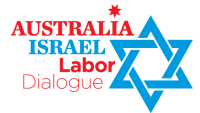Why Labor Movement Activists Should Oppose Boycotts, Disinvestment and Sanctions (BDS)
“Definitely, most definitely, we oppose a Jewish state in any part of Palestine. No Palestinian, rational Palestinian, not a sell out Palestinian, would ever accept a Jewish state in Palestine.” Omar Bargouti, Co-founder, BDS movement, 26 May 2014

Book Launch – Hon. Michael Danby MHR, Dr Nick Dyrenfurth, Associate Professor Philip Mendes & Hon. David Feeney MHR, StKilda, 14 June 2015
The Boycotts, Disinvestment and Sanctions (BDS) movement seeks to achieve a total boycott of anything Israeli, whether it be cultural, academic, economic or trade related.
Support for the BDS campaign will not end the occupation of lands captured by Israel during the Six Day War in 1967 as this can only be achieved by the two sides to the conflict reaching a negotiated settlement.
History has demonstrated that in settlement of previous conflicts, Israel has withdrawn from land captured in wars initiated by Arab states. For example, the Sinai Peninsula was returned to the Arab Republic of Egypt following the peace agreement reached in 1979 and lands have been returned to the Hashemite Kingdom of Jordan as part of the Treaty of Peace signed in 1994.
The pursuit of BDS hinders the peace process as most commentators view the real goal of BDS as the elimination of Israel as a nation state of the Jewish people. BDS is, as Australian Labor Party leader Anthony Albanese has stated is “racially targeted”, and therefore to be opposed.
BDS is viewed as trafficking in anti-Semitism as its proponents do not push it to be applied to any other country involved in territorial disputes (for example, the occupation of Crimea by Russian Federation and the occupation of Tibet by the Peoples Republic of China). BDS also aims to end the Jewish character of Israel by subverting its Jewish majority.
 BDS does nothing to assist with the development of the democratic characteristics and institutions desirable in a future Palestinian state.
BDS does nothing to assist with the development of the democratic characteristics and institutions desirable in a future Palestinian state.
BDS is counter productive to resolving the conflict because it rejects Israel’s right to exist despite settled international law. In 1949, Australia supported Israel’s admission to the United Nations as a member state.
There are twenty-two Arab states and forty-five Islamic countries. In the world’s only Jewish majority state, one fifth of the citizenry are not Jewish. In Israel, Arabs serve as members of parliament and judges, and vote in regular free and fair elections. Discrimination based on gender, religion and ethnicity is a contravention of Israeli law. As the only democracy in the Middle East, Arab Israelis and Christians living in Israel enjoy greater human rights and protections than any other country in the region.
BDS also strengthens the resolve of the Palestinian factions not to negotiate directly with Israel.
Israeli law guarantees that non-citizens receive the same wages and conditions as Israeli citizens. The closure of Israeli businesses in the Palestinian territories harms Palestinian workers and their families by reducing job opportunities and limiting access to well paid jobs and healthcare insurance.
In 1995, under the auspices of the International Trade Union Confederation, the Histadrut (Israel’s oldest and largest trade union federation) and the Palestinian General Federation of Trade Unions (PGFTU) signed an agreement whereby fifty percent of all union dues from Palestinian workers employed by Israeli employers are remitted to the PGFTU. The Histadrut and PGFTU are also co-operating at confederation and union levels. There is extensive co-operation especially in the building and construction industry on a variety of issues including work health and safety. A video highlighting this co-operation can be found here.
The agreement also provides a mechanism by which the Histadrut provides legal representation to Palestinian workers in actions against Israeli employers in relation to the under-payment of wages.
Following the signing of the agreement, PGFTU General Secretary Shaher Sae’d said “This removes a key obstacle to future cooperation and the full respect of the rights of Palestinian workers. Decent work is a foundation stone for political and economic justice, and we will now be in a position to devote even more attention to tackling the appalling state of the Palestinian economy and playing a fuller part in the quest for justice, fairness and democratic rights in the building of a Palestinian state.”
“We are very pleased that this agreement has now been reached,” said Histadrut Chairperson Ofer Eini. “Every worker, whether of Israeli, Palestinian or other origin, must have full rights to the protections offered by international labour standards. The outcome of our dialogue with the PGFTU can only help achieve this and help lay the foundations for future cooperation between Israeli and Palestinian trade unions and progress in our shared quest for justice, peace and prosperity for all in the region,” he added.
Support for BDS would undermine Australia’s ability to act as an honest broker between the parties to the conflict. As Anthony Albanese has said, “I have always worried about those who argue for a one-state solution. It will just continue the conflict.”.
BDS is supported by numerous terrorist groups including Hamas, Hezbollah, the Popular Front for the Liberation of Palestine, and Palestinian Islamic Jihad.





